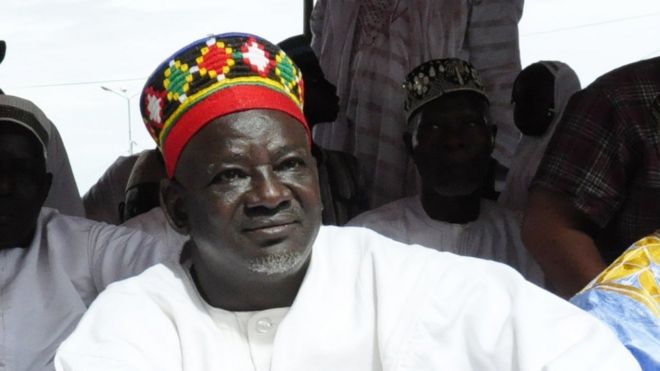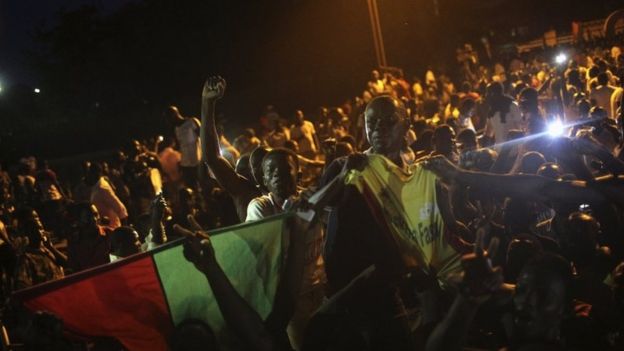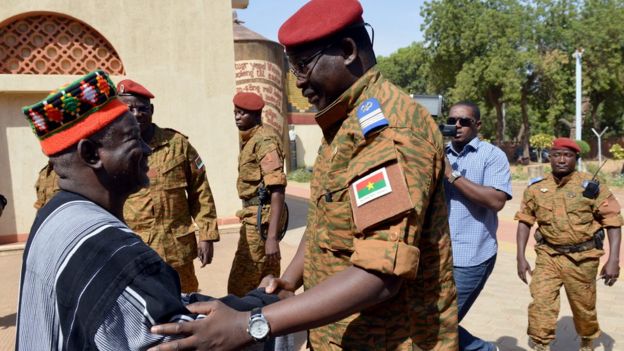
The Mogho Naba, King of Burkina Faso
Whilst traditional kings and queens have vanished in Gambian social and political life, Burkina Faso’s Mossi King Mogho Naba played a crucial role in ending the standoff between the regular army and the State Guards. The King who played a neutral broker made sure the regular army and the will of the people prevailed. Contrast the traditional Mossi king in Burkina Faso and the lame and APRC propaganda so-called Chiefs or Seyfolu that dictator Jammeh can remove, replace and disgrace at all and at any time.
The Burkina Faso King is seen as the face and voices of the people.
Read the Mossi King’s intervention an see how we have thrown away our own history with firm pillars away.
The Mogho Naba played a key role in brokering the return of civilian rule to Burkina Faso after last week’s military takeover. The BBC’s Lamine Konkobo has this profile of the traditional ruler.
Mogho Naba is the title of the reigning monarch of the Mossi ethnic group and reigns over a traditional kingdom that dates back to the 12th Century.
The title means the “king of the world” in the language of the Mossi community, who constitute about 40% of the country’s population of 17 million people.
Baongo II has been king since 1982.
Once a powerful master over his Mossi subjects, the authority of the Mogho Naba was significantly curtailed during the presidency of anti-imperialist revolutionary Thomas Sankara prior to his death in October 1987.
Nowadays, the Mogho Naba is seen as a symbol of tradition.
The influence of the king in modern political matters is based on the fact that the centre of power in Burkina Faso, the capital Ouagadougou, lies at the heart of his kingdom – the Mossi Plateau.
Out of respect for tradition, it is customary for powerbrokers seeking to establish a foothold in Ouagadougou to seek his symbolic approval.
 Image copyrightReuters
Image copyrightReuters Image copyrightGetty Images
Image copyrightGetty ImagesMPs elected to the national parliament, ministers as well as ambassadors are known to respect that tradition.
In times of crisis, the role of the “Naba” becomes even more important.
Like the British Queen, he is supposed to be politically neutral, which is an asset when there is a breakdown of dialogue.
Since the uprising of October 2014, when President Blaise Compaore was forced to resign by massive street protests, protagonists of the crisis have taken turns visiting his compound, seeking to benefit from his wisdom.
For instance, the transitional Prime Minister, Lt-Col Isaac Zida, went to the king’s palace for a courtesy visit shortly after taking power following the popular revolt.
He later returned again when presidential guards, in July this year, stormed a cabinet meeting to demand his resignation from the government.
And it was no surprise that the coup leader, Brig-Gen Gilbert Diendere, paid Baongo II a visit following the announcement earlier this week that army units were bearing down on Ouagadougou to disarm his soldiers.
The king is said to have played a key role in helping Burkina Faso avoid a bloodbath as negotiations between officers from both side of the military spectrum took place in pursuit of an end to the stand-off following last week’s coup.
Baongo II is well suited to such diplomacy – he is Western-educated, speaks French eloquently, is an avid football fan and was a one-time boxer.
But in official functions, he only speaks Moore, his mother tongue. He engages his various guests through his spokesperson, Larle Naba, his minister of communication and custodian of oral tradition and folklore.




Deyda Haidara
The Mogho Naba was the one who brokered the two presidential term limits that Blaise and the Opposition agreed upon back in 2006. His intervention made the Burkinabes to espouse PATIENCE knowing Blaise will go in a maximum of 10 years even he steals the elections. Come 2014, Blaise as usual being a liar,a deceiver, a hyppocrite and greedy traitor decided to change the constitution to accord himself another term in office. The result was the uprising that sent him running for his life. The Mogbo Naba true to his promise back in 2006 refused to receive Blaise in his palace whence the END of Blaise. The burkinabe is known to stand for “Integrity or Integre in french” They respect the given WORD and the PROMISE. This fact is known by all the francophone countries in Africa and the World.
In the Gambia Jammeh is an IMPOSTOR Mansa, he killed and corrupted all tarditional and religious powers in the Gambia. No matter how long he rules the Gambia with the barrel of the gun, Gambians will one day rise up and take back their country.
When Jammeh dies he will not have a fitting burial as the dignified and true natural King demise.
Jammeh will be given to his own crocodiles to taste a rare meat of their master.